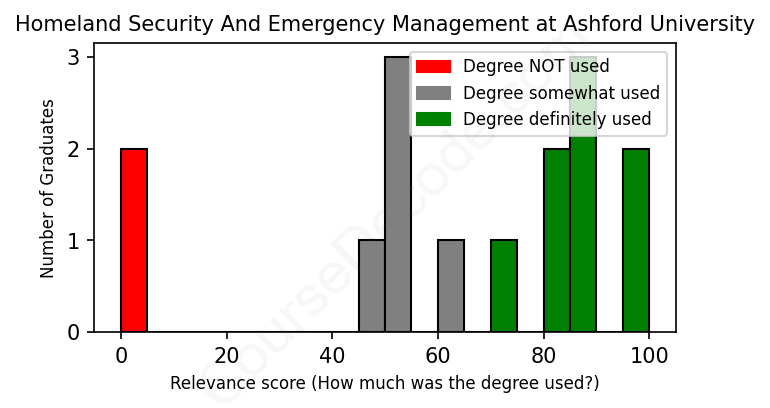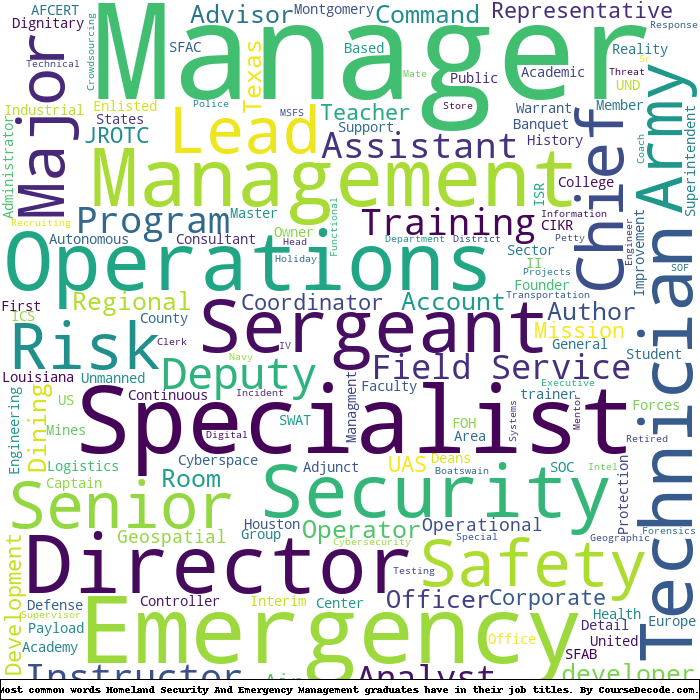
First, some facts. Of the Homeland Security And Emergency Management graduates from Ashford University we've analyzed , here's how many have used (or NOT used) their degree in their career:

These are estimates based on AI analysis of 15 LinkedIn profiles (see below).
The verdict? Slightly below average. Overall, with an average relevance score of 63%, Homeland Security And Emergency Management graduates from Ashford University have a slightly lower likelihood (-4%) of finding work in this field compared to the average graduate across all fields:
And for comparison, here's the chart for all profiles we've looked at across all degrees.
Also, after graduating, 40% of these graduates have pursued further education other than another Bachelor's degree (such as a Masters degree or other), compared to the average across all profiles of 35%. This suggests you may need more than just a Bachelors degree to be competitive as a Homeland Security And Emergency Management graduate.
See the details:
|
Relevance score: 0% We think this person has NOT gone into a career related to their degree. We think this person has NOT gone into a career related to their degree.
DEGREE INFOGraduated in 2013 from Ashford University with a Bachelor of Arts (B.A.) in Homeland Security And Emergency Management. Also pursued further education since (see below). JOB HISTORY SINCE GRADUATIONBanquet Captain/Dining Room Manager Boca West Country Club, Inc. Sep 2014 - Apr 2015 Dining Room Manager  Billy Casper Golf Jun 2016 - Dec 2016 FOH Manager  The Alchemist Gastropub Jan 2017 - Mar 2017 General Manager  Relish & More Apr 2018 - Present FURTHER DEGREES DONE SINCE GRADUATINGChemical Operations Specialist 74DUnited States Army 2009 - 2014 ABOUTI believe two of the biggest keys to being a successful leader are...lead by example, not just instruction. And second...always show appreciation. |
The top 10 most common jobs done by the graduates we've analyzed (ranked most common to least) are:
When looking at the job choices of Ashford University graduates with a degree in Homeland Security and Emergency Management, there seems to be a mix of relevant and unrelated roles. Many graduates pursued positions in the military or security fields, like several roles at the United States Air Force and US Navy, which directly relate to homeland security principles and emergency management. These jobs utilize core skills and knowledge obtained from their degrees, such as critical thinking, operational oversight, and risk management. However, there's also a notable number of individuals who ventured into hospitality or other unrelated sectors, like restaurant management, where the degree's teachings on emergency procedures and security management aren't really needed.
Overall, while some graduates are actively using their education in meaningful ways within homeland security frameworks, a good portion of them seems to have taken paths that don’t fully align with their degree's focus. Many have found employment in roles that only casually touch on security concepts or even in fields that are completely outside the realm of emergency management. This suggests a varied landscape where graduates might find themselves, some making impactful contributions while others are possibly working in fields that don’t necessarily leverage the specialized training they received at Ashford. It’s a classic case of finding the right fit; even with a homeland security degree, there are many directions one can take, and not all of them are directly relevant to what they studied.
Here is a visual representation of the most common words in job titles for Homeland Security And Emergency Management graduates (this is across all Homeland Security And Emergency Management graduates we've analyzed, not just those who went to Ashford University):

Graduates from Ashford University with a degree in Homeland Security and Emergency Management seem to have a pretty diverse set of career paths. Right after graduation, many of them find themselves in roles that connect with security, operations, or management within military or defense-oriented organizations. For instance, a lot of the early jobs include positions in the U.S. Air Force and Navy, and some land roles in private security. This suggests that fresh graduates are often getting their feet wet in environments that directly relate to their studies, particularly in government or military settings. However, there are also instances where graduates move into fields like restaurant management and administrative roles, which aren’t directly tied to Homeland Security but may offer valuable general management skills.
Looking further down the line, around five to ten years after graduation, many are advancing in their careers significantly. A good number have transitioned into high-ranking positions such as Command Master Chief or various leadership roles in the military, demonstrating a clear upward trajectory tied to their initial education. Others have carved out roles in cybersecurity or security management, effectively linking their academic background with practical experience. Despite some graduates taking detours into less relevant fields early on, it seems like many ultimately find their way back into areas that reflect their degree over time. Overall, while not every career may be directly related to Homeland Security and Emergency Management in the beginning, there’s a promising trend of alignment as they gain more experience in the field.
A Bachelor’s degree in Homeland Security and Emergency Management at Ashford University is generally considered to be on the easier side compared to some more technical or demanding fields like engineering or medicine. It’s pretty manageable, especially if you’re good at research and enjoy writing, since a lot of the coursework involves understanding policies, emergency response, and some case studies. Plus, the online format allows for a decent amount of flexibility, which can help reduce stress. But just like with any degree, it still requires commitment and organization, so don't think it’s a total walk in the park! Overall, if you stay on top of your assignments and participate, you should be able to navigate through it without too much trouble.
Most commonly, in the LinkedIn profiles we've looked at, it takes people 3 years to finish a Bachelor degree in Homeland Security And Emergency Management.
Looking at the career paths of these Homeland Security and Emergency Management grads from Ashford University, it seems like they've generally landed some decent jobs, especially those who went into military or government positions. Many have held leadership roles like Command Master Chief or Operations Sergeant Major, which typically come with good salaries and benefits. The graduates who moved into private sectors or started their own businesses also seem to be doing alright, with roles that suggest they’re earning decent pay, especially in fields like cybersecurity and security management. However, it’s not all rosy; some started in roles that likely paid less, especially in the hospitality sector. Overall, it appears that a lot of these folks are on a solid career trajectory, which usually leads to better pay over time.
Here is a visual representation of the most common words seen in the "about" section of LinkedIn profiles who have a Bachelor degree in Homeland Security And Emergency Management (this is across all Homeland Security And Emergency Management graduates we've analyzed, not just those who went to Ashford University). This may or may not be useful:

Here are all colleges offering a Bachelor degree in Homeland Security And Emergency Management (ordered by the average relevance score of their Homeland Security And Emergency Management graduates, best to worst) where we have analyzed at least 10 of their graduates:
| College | Score | Count |
|---|---|---|
 Ashford University Ashford University
|
63 | 15 |